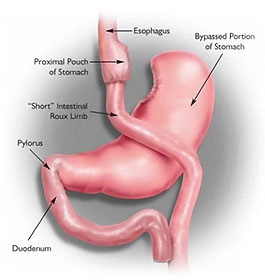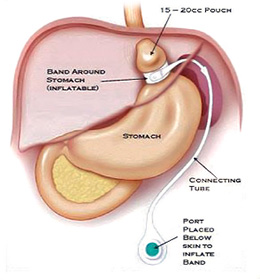NuHealth is now a Center of Excellence site for Bariatric Surgery
Excessive weight is one of the leading risk factors for the development of diabetes, hypertension and cardiovascular disease. Fortunately, significant weight loss usually improves or eliminates these conditions. When those and other methods have failed, however, NuHealth’s bariatric surgeons at Nassau University Medical Center can help you achieve substantial weight loss through a variety of procedures, including the two most popular methods:
- Roux en Y Gastric Bypass (pronounced “Roo-N-Why”)
- Adjustable Gastric Banding (also known as the LAP-Band procedure)
NuHealth’s bariatric surgeons are also experienced with a number of less common procedures, including:
- Biliary Pancreatic Diversion
- Gastric Sleeve Resection
Long-term studies show that patients who undergo bariatric surgery can achieve percentage losses ranging from 25% to 80% of excess body weight, recovery from diabetes, improvement in cardiovascular risk factors, and a reduction in mortality of nearly half.
How does bariatric surgery work?
Weight loss surgeries work by restricting the amount of food that you eat and/or altering your body’s ability to absorb food. Overeating is curbed because exceeding the capacity of the stomach, or eating foods that are high in fat causes nausea and vomiting. The two most common procedures are described below:
Gastric bypass can be performed as an open or minimally invasive (laparoscopic) procedure. The surgeon creates a small stomach pouch and bypasses a part of the intestine, restricting both the amount of food you eat and the opportunity for food to be absorbed.
Usually performed as minimally invasive surgery, gastric banding entails placing a band around the upper part of the stomach. This band compartmentalizes the stomach into a small upper pouch and a larger lower part. You feel full earlier as the upper pouch is small. Thus it works by only restricting the amount of food you eat. As the name suggests, your surgeon can adjust the band via a port placed under the skin to ensure proper weight loss.
Is bariatric surgery right for me?
The U.S. National Institutes of Health recommends bariatric surgery for obese people with a body mass index (BMI) of at least 40, and for people with BMI 35 and serious coexisting medical conditions such as diabetes. Any surgical procedure carries some degree of risk that should be factored into your decision making, but the overall risk of remaining morbidly obese generally outweighs the surgical risks. Still, bariatric surgery is not a “magic pill” – to achieve significant, permanent weight loss you must be prepared to exercise and follow a restricted diet (the level of restriction varies with the type of surgical procedure) for the rest of your life. If you can’t make that kind of commitment, you probably won’t lose the weight you desire, and you may be putting yourself at additional risk for serious, even deadly, complications.
Which type of weight loss surgery is best?
Ultimately, the right bariatric procedure for you is the one that will help you to safely achieve your weight loss goals. While many believe gastric bypass enables faster and more significant weight loss, it is also irreversible and often requires a longer recovery period both in and out of the hospital. What’s more, gastric bypass surgery patients must be even more careful about adhering to a strict diet than those who undergo gastric banding (although both typically require a high-protein, low-fat and nearly alcohol-free diet) . As a result of these factors, the LAP-BAND® and other gastric banding procedures have increased in popularity. But recent studies have shown that successful weight loss is more dependent on the individual’s willingness to exercise and follow a healthy nutritional plan. Your bariatric surgeon and others in the Zaki Hossain Center will explain the details and help you select the procedure that makes the most sense for you.
Post Surgery
The care you receive following surgery is just as important as the skill and expertise of the surgeon. At the Zaki Hossain Center, every aspect of your recovery and ongoing weight loss is managed by a team of physicians, nurses, nutritionists, psychotherapists, exercise consultants and others. These caring professionals work together to you help you adjust to the lifestyle changes associated with bariatric surgery and monitor your health as you progress toward your weight loss goals. They are almost as invested in your success as you!
To make an appointment to discuss bariatric surgery, call (516) 486-6862.
Clinical Staff
Venkatesh Sasthakonar, MD
George Angus, MD



